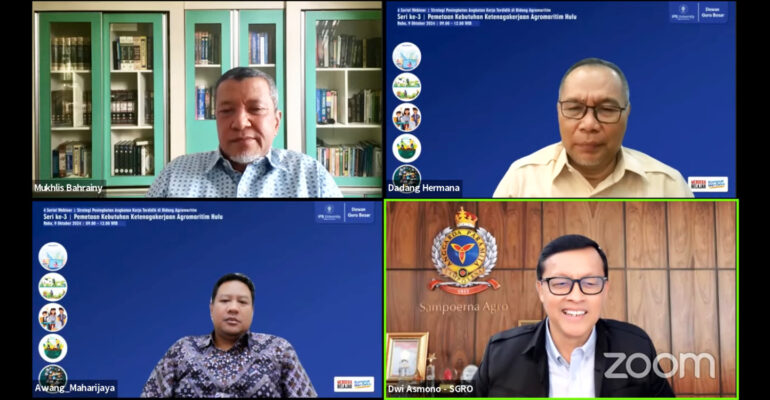The Board of Professors of IPB University Reveals the Mapping of the Labour Force of the Agromaritime Sector

The Board of Professors (DGB) of IPB University once again held a webinar entitled ‘Mapping of Upper Agromaritime Labour Needs’ on Wednesday (9/10). This webinar presents a number of speakers from IPB University and the private sector to discuss the challenges and opportunities in improving the quality of the labour force in agromaritime sector.
In this discussion, the experts highlighted an importance of modernisation and innovation in the horticulture, livestock, and fisheries sectors, in order to overcome various existing obstacles.
Prof Awang Maharijaya, Professor of the Faculty of Agriculture of IPB University, explained the main challenges in Indonesia’s horticulture sector, which still depends on imports, especially in terms of seeds and production components.
He emphasised that in addition to improving technology in agriculture, this sector also needs a trained workforce. However, currently only about 5-10 percent of the workforce has high skills.
“Only 5-10 percent of horticultural labour has high skills, while the need for trained personnel is increasingly urgent to overcome challenges in this sector,” he added.
This opens up great opportunities for the young generation to have a career in the horticulture sector, which has the potential to support food security and Indonesia’s exports to the global market.
Meanwhile, Prof Nahrowi, Professor of the Faculty of Animal Science of IPB University revealed the big challenges in the livestock sector, especially related to the quality of human resources (SDM).
“Our farm is far behind neighbouring countries, one of which is caused by poor quality human resources,” he said.
The majority of workers in this sector are still under-educated, with only about 2 percent of undergraduate graduates involved. For that, he proposed that college graduates be given special training to be ready to work in the upstream sector of livestock.
In addition, Prof Nahrowi also highlighted the importance of integrating the livestock sector with oil palm plantations and forestry to support food security.
“If we can utilise 10 percent of 16.8 million hectares of oil palm land, livestock can grow rapidly,” he said.
In the fisheries sector, especially shrimp farming, Ir Mukhlis Bahrainy, CEO of PT Pachira Group, revealed the need for professional labour to provide counselling and assistance to farm farmers.
“The government must provide professional labour in the field of pond fisheries,” he said. He also emphasises the importance of relevant education and focusses on practical skills that can be applied directly in the field.
“If this sector is well managed, within ten years, the need for labour in the shrimp farming sector can increase to 400,000 people,” he concluded.
The discussion in this webinar makes it clear that to face challenges in the agromaritime sector, Indonesia needs a workforce that is not only sufficient in number, but also qualified and able to adapt to the development of technology and mechanisation.
“What is needed is not only the number of educated labour, but the quality and ability to adapt to the needs of the industry,” said Dr Dwi Asmono, Research and Development Director of PT Sampoerna Agro, who is also a speaker.
Therefore, it is important for educational institutions to continue and adjust their curriculum to the needs of the industrial world so that graduates can be ready to jump in directly, including in production areas that require skilled workers. (MW/RZ) (IAAS/TIA)



